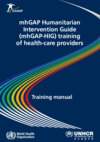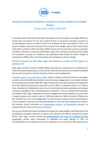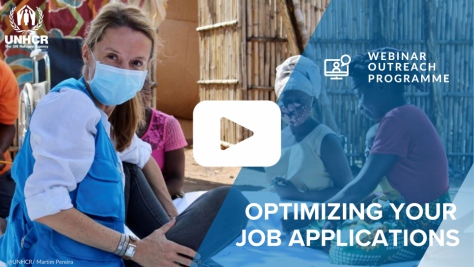Men, women and children suffering from harsh physical conditions and legal shortcomings at Pacific Island asylum centres: UNHCR reports
This is a summary of what was said by UNHCR spokesperson Adrian Edwards – to whom quoted text may be attributed – at today's press briefing at the Palais des Nations in Geneva.
In two reports released today, UNHCR finds that asylum-seekers transferred from Australia to processing centres at Nauru and Manus Island in Papua New Guinea (PNG) are living in arbitrary detention in conditions that do not meet international standards of treatment.
UNHCR understands Australia's determination to respond robustly to the challenges of people smuggling and to dissuade people from undertaking dangerous irregular travel by sea. However we believe those responses must not neglect the compelling protection needs, safety and dignity of the individuals affected.
These reports are also in the context of what UNHCR has observed to be a sharp deterioration during 2013 in the overall quality of protection and support available to asylum-seekers and refugees who come to Australia by boat. It remains the case that when policies and practices are based primarily on deterrence, they can have harmful and, at times, punishing consequences for people affected, particularly families and children.
The reports identify troubling shortcomings at both centres, and urge all three States involved to consider the findings and recommendations and act upon them.
In both Nauru and PNG the current policies, operational approaches and harsh physical conditions at the centres not only do not meet international standards - they also have a profound impact on the men, women and children housed there.
UNHCR is concerned that they constitute mandatory detention which is not compatible with international law. We are also worried that they do not provide a fair and efficient system for assessing refugee claims, do not provide safe and humane conditions of treatment in detention, and do not provide for adequate and timely solutions for recognized refugees.
With the Nauru report, it acknowledges some positive developments since our last visit in March. However, there have also been significant setbacks in refugee processing, and a deterioration in reception conditions. Despite a processing system being in place under Nauru law, only one decision has been handed down in the 14 months since the centre reopened.
No decisions at all have been finalized at the centre in PNG, and while some improvements were observed since UNHCR's last inspection in June, the physical conditions within detention, together with the slowness of processing and the lack of clarity regarding safe and sustainable solutions for refugees were likely, together, to have a serious and negative effect on the health and welfare of people transferred from Australia.
At both centres, the psycho-social well-being of vulnerable people - including survivors of torture and trauma and unaccompanied children - is an issue of concern. UNHCR also called on all three States not to transfer children, particularly those who are unaccompanied, unless and until there has been a marked improvement in conditions in both centres.
UNHCR is particularly concerned by the impact of policies that will prevent recognized refugees from finding safe, dignified and sustainable solutions in the medium to long term. The prospect for refugees in PNG finding permanent protection there presents formidable challenges, and it is clear that Nauru will offer only very limited opportunities for refugees even in the shorter term.
UNHCR believes the arrangements at Nauru and PNG would benefit from a much clearer articulation of the policy and operational framework that would set out how, when and where refugees will be able to secure protection and exercise the rights required under the 1951 Refugee Convention.
The full reports, including recommendations, are available at: www.unhcr.org.au
For more information on this topic, please contact:
- In Canberra (Regional): Ben Farrell on mobile +61 407 971 686
- In Geneva: Adrian Edwards on mobile +41 79 557 91 20
- Babar Baloch on mobile +41 79 557 9106
Related news and stories
Global photo project shows power of football during displacement
The Kenyan powerhouse improving women's lives in Australia
UN refugee chief welcomes cities' support for refugees
UNHCR appeals to Australia to act and save lives at immediate risk
UNHCR urges Australia to end separation of refugee families
'We must believe we can make a difference and we can do things better' - Andrew Harper
-

Statement on risks of trafficking and exploitation facing refugees from Ukraine attributed to UNHCR's Assistant High Commissioner for Protection
12 Apr 2022 The following statement is attributed to Gillian Triggs, UNHCR's Assistant High Commissioner for Protection -

MHPSS Annex of Public Health Strategy 2021-2025
11 Apr 2022 The Public Health Strategy 2021-2025 reaffirms the importance of public health in preparation for, and in response to, refugee emergencies addressing the main causes of morbidity and mortality. -

mhGAP HIG Training Materials
11 Apr 2022 The mental health Gap Action Programme (mhGAP) is a WHO programme that seeks to address the lack of care for people suffering from mental, neurological and substance use (MNS) conditions. The mhGAP-IG is a clinical guide for general health-care providers who work in non-specialized health-care settings, particularly in low- and middle-income countries. The mhGAP-HIG was developed in order to address specific challenges in humanitarian emergency settings. -

Résumé - Réunion d'information informelle et virtuelle sur le Pacte mondial sur les réfugiés
11 Apr 2022 -

UNHCR Country Strategy Evaluation: Zambia
11 Apr 2022 Zambia hosts the longest-standing refugee settlement in Africa, at Mayukwayukwa. It was established in 1966 and UNHCR has been actively engaged in the country since that time. As part of its 2020 workplan, UNHCR's Evaluation Service commissioned an independent evaluation team to conduct a Zambia country strategy evaluation for the period 2015 to 2020. The purpose of this forward-looking evaluation is to generate evidence to inform UNHCR's future operational planning and strategy in Zambia. The evaluation also aims to provide inputs into UNHCR Zambia's multi-year planning strategy beyond 2022. Attachments: Management Response and Annexes (.zip) -

UNHCR's Assistant High Commissioner lauds solidarity of Romania and the Republic of Moldova towards Ukrainian refugees
9 Apr 2022 -

Ukraine: How does cash assistance empower refugees?
8 Apr 2022 -

Optimizing Job Applications web
8 Apr 2022 -

Summary record - EC/73/SC/SR.1
8 Apr 2022
